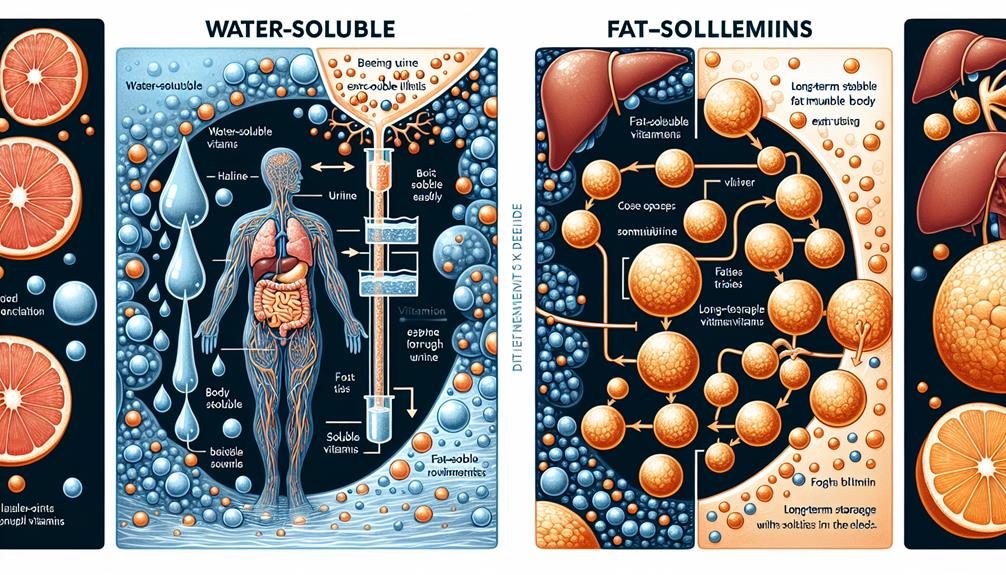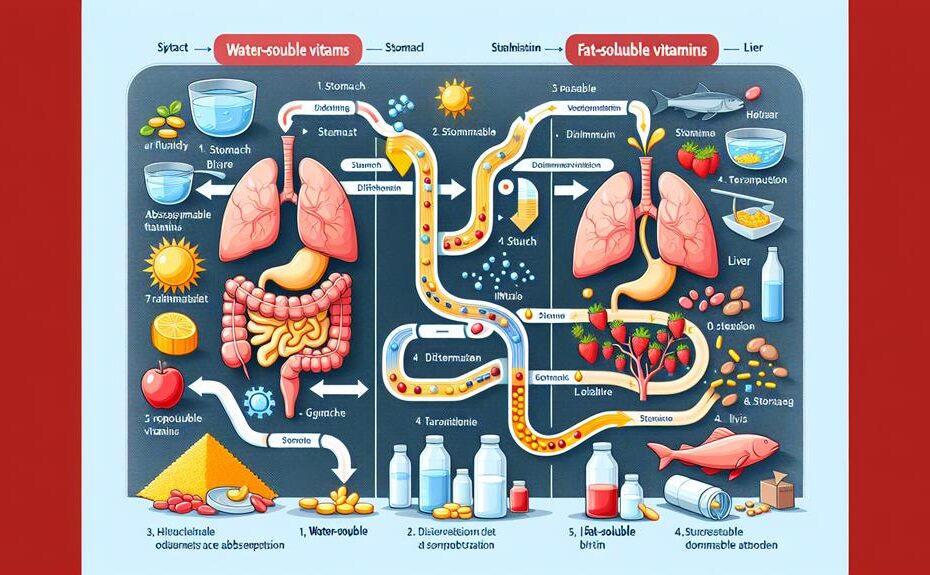







When it comes to water-soluble and fat-soluble vitamins, the key contrast is their importance and storage in your body. Water-soluble vitamins dissolve in water, not stored much, and absorbed via your small intestine. In contrast, fat-soluble vitamins need dietary fat for absorption and are stored in your fatty tissues and liver. Balancing your diet is vital for best vitamin utilization. Remember, vitamins play essential roles in overall health and well-being. Understanding how they differ guarantees you get the right nutrients. Get the insights you need to nurture your body and maintain peak health.
Key Takeaways
- Water-soluble vitamins dissolve in water and are not stored in the body.
- Fat-soluble vitamins are absorbed best with dietary fat and stored in fatty tissues.
- Water-soluble vitamins are excreted in urine, while fat-soluble vitamins are stored in the liver.
- Monitoring fat-soluble vitamin intake is crucial to avoid toxicity.
- Water-soluble vitamins need regular intake from dietary sources.
Overview of Vitamin Solubility
Understanding the solubility of vitamins is essential in comprehending their absorption and utilization by the body. Vitamins are classified based on their solubility into water-soluble and fat-soluble categories. Water-soluble vitamins, such as vitamin C and the B-complex vitamins, dissolve in water and are not stored in the body to a significant extent. In contrast, fat-soluble vitamins, like vitamins A, D, E, and K, are best absorbed when consumed with dietary fat and are stored in the body's fatty tissues for future use.
Nutrient absorption plays an important role in the body's ability to utilize vitamins effectively. Water-soluble vitamins are readily absorbed into the bloodstream through the intestinal wall and are excreted in the urine if consumed in excess. On the other hand, fat-soluble vitamins require bile acids for absorption and are transported through the lymphatic system before entering the bloodstream.
Considering the dietary implications, a balanced diet that includes a variety of foods rich in both water-soluble and fat-soluble vitamins is essential for overall health and well-being. Adequate intake of these vitamins through food sources or supplements is necessary to prevent deficiencies and maintain an ideal physiological function.
Absorption in the Body
Absorption of water-soluble and fat-soluble vitamins in the body varies due to their distinct solubilities and transport mechanisms. Water-soluble vitamins, such as vitamin C and the B-complex vitamins, are absorbed directly into the bloodstream through the small intestine. Their absorption mechanisms involve simple diffusion or facilitated diffusion, which allows for efficient absorption. In contrast, fat-soluble vitamins, like vitamins A, D, E, and K, require bile acids and fat for absorption. These vitamins are absorbed along with dietary fats in structures called micelles and then incorporated into chylomicrons before entering the lymphatic system.
Efficiency of absorption is essential for maintaining ideal vitamin levels in the body. Factors like the presence of certain digestive disorders can impact absorption to a noteworthy extent. For example, individuals with conditions affecting fat absorption, such as cystic fibrosis or liver diseases, may have reduced absorption of fat-soluble vitamins. Similarly, disorders like Crohn's disease or celiac disease can impair the absorption of various vitamins due to compromised intestinal function. Understanding these absorption mechanisms and their potential disruptions is vital for ensuring adequate vitamin intake and overall health.
Storage and Excretion

Efficient storage and excretion of vitamins play a pivotal role in maintaining ideal levels within the body. Water-soluble vitamins, such as vitamin C and the B-complex vitamins, are not stored in large amounts in the body. Any excess water-soluble vitamins that are consumed beyond what the body needs are usually excreted in the urine. This means that it is important to regularly consume these vitamins through your diet to maintain ideal levels.
Fat-soluble vitamins, including vitamins A, D, E, and K, are stored in the body's fatty tissues and liver. This storage mechanism allows the body to draw upon these vitamins when dietary intake is low, helping to prevent deficiencies. However, because fat-soluble vitamins can be stored in the body, it is essential to avoid consuming excessive amounts, as they can accumulate to toxic levels over time.
Renal clearance is the process by which the kidneys filter and remove waste products, including excess water-soluble vitamins, from the blood to be excreted in the urine. Monitoring your intake of both water-soluble and fat-soluble vitamins is important for maintaining a healthy balance and preventing potential toxicity.
Sources of Water-Soluble Vitamins
Water-soluble vitamins, unlike fat-soluble vitamins, are not stored in large amounts in the body and must be regularly obtained through dietary sources to meet the body's requirements. Cooking methods can affect the vitamin content in foods; for water-soluble vitamins such as Vitamin C and the B-vitamins, it is advisable to use minimal water and shorter cooking times to preserve their content. Bioavailability, or the extent to which vitamins are absorbed and utilized by the body, can also be influenced by food processing methods.
Seasonal variations in food availability can impact your intake of water-soluble vitamins. For instance, fruits and vegetables tend to be richer in these vitamins during the summer months. It is essential to consume a diverse range of foods throughout the year to secure an adequate supply of water-soluble vitamins. Be mindful of how you prepare and process your foods to maintain the nutrient content and optimize the absorption of these essential vitamins.
Sources of Fat-Soluble Vitamins

Fat-soluble vitamins are found in various food sources and play essential roles in maintaining overall health and well-being. Vitamin A can be sourced from liver, dairy products, and colorful fruits and vegetables. Vitamin D can be obtained from fatty fish, egg yolks, and fortified foods. Vitamin E is present in nuts, seeds, and vegetable oils. Lastly, Vitamin K is found in green leafy vegetables, liver, and some vegetable oils. The absorption mechanisms of fat-soluble vitamins differ from water-soluble vitamins. Fat-soluble vitamins require bile acids and pancreatic enzymes for absorption. They are absorbed along with dietary fats in the small intestine and are then transported through the lymphatic system. Unlike water-soluble vitamins that are not stored in the body and are excreted in urine, fat-soluble vitamins can be stored in the liver and adipose tissue for later use. These vitamins are vital for various bodily functions, including vision, bone health, antioxidant protection, and blood clotting.
Health Implications of Deficiency
Inadequate intake of fat-soluble vitamins can lead to a range of health implications due to their essential roles in various bodily functions. Fat-soluble vitamins A, D, E, and K are important for normal growth, immune function, vision, blood clotting, and other physiological processes. Deficiency in these vitamins can have long-term effects on health.
Vitamin A deficiency, for instance, may result in night blindness and increased susceptibility to infections. Vitamin D deficiency can lead to weakened bones and increased risk of fractures. Vitamin E deficiency may cause nerve damage and muscle weakness. Vitamin K deficiency can impair blood clotting, leading to excessive bleeding.
The dietary impact of fat-soluble vitamin deficiencies is significant. These vitamins are mainly found in fats and oils, as well as in certain foods like dairy products, leafy greens, and fatty fish. Individuals with restricted fat intake, malabsorption issues, or specific dietary restrictions may be at higher risk of deficiencies. It is important to ensure adequate intake of fat-soluble vitamins to maintain optimal health and prevent long-term consequences.
Daily Requirements and Recommendations

Insufficient intake of certain vitamins can have significant health consequences, underscoring the importance of understanding the daily requirements and recommendations for peak health. Meeting your daily nutritional needs is vital for overall well-being. The recommended daily intake of vitamins varies depending on factors such as age, sex, and life stage. Dietary guidelines provide a framework for achieving these requirements through a balanced diet rich in vitamins and minerals. It is essential to consume a variety of foods to make sure you are getting an adequate amount of each vitamin. For example, vitamin C is water-soluble and sensitive to heat, so consuming fresh fruits and vegetables is important to meet your daily needs. On the other hand, fat-soluble vitamins like vitamin D can be found in foods like fatty fish and fortified dairy products. Understanding your daily requirements and following dietary guidelines can help you maintain peak health and prevent deficiencies.
Considerations for Supplementation
Think about incorporating vitamin supplementation into your routine to ensure you meet your daily nutritional needs effectively. When choosing supplements, it is vital to take into account potential interactions with other supplements or medications you may be taking. Some vitamins can impact the absorption rates of others, so it is advisable to consult with a healthcare provider before starting any new supplement regimen.
Supplement interactions can affect how well your body absorbs and utilizes vitamins, potentially leading to imbalances or deficiencies. Understanding how different vitamins interact can help you make informed choices when it comes to supplementation. Additionally, taking into consideration the absorption rates of water-soluble and fat-soluble vitamins is essential for optimizing their benefits. Water-soluble vitamins are easily absorbed but not stored in the body, requiring consistent intake. On the other hand, fat-soluble vitamins are stored in the body, so it is important not to exceed recommended dosages to prevent toxicity.





